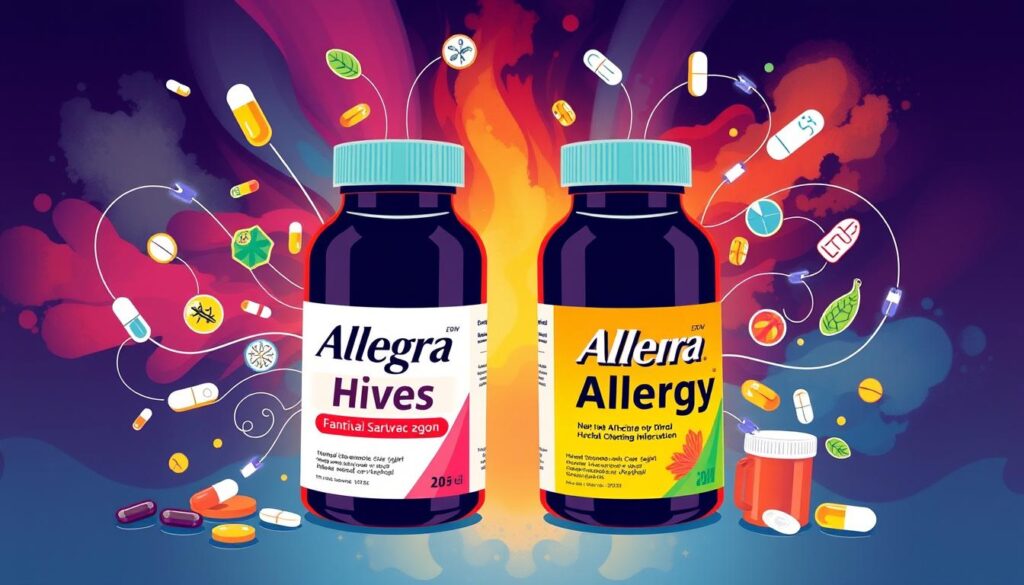Dealing with allergies or sudden skin issues can be tough. I’ve faced seasonal allergies and hives, and finding the right treatment is hard. We’re diving into fexofenadine hydrochloride, the key in Allegra, to understand the differences between Allegra Hives and Allegra Allergy.
Allergic reactions and hives need different treatments. The world of antihistamines isn’t one size fits all. Knowing the differences between Allegra Hives and Allegra Allergy can greatly improve your treatment plan.
Key Takeaways
- Allegra offers specialized formulations for different allergic conditions
- Fexofenadine hydrochloride targets specific allergic symptoms
- Understanding medication differences improves treatment effectiveness
- Not all antihistamines work identically for every condition
- Consulting healthcare professionals ensures personalized treatment
Understanding Allegra: An Overview
Allegra is a strong solution for those with allergy symptoms. Our guide dives into this top antihistamine. It helps millions of people across the country.
Allegra is a trusted medication for allergies. It has fexofenadine hydrochloride as its main ingredient. This antihistamine targets specific receptors in the body, unlike traditional treatments.
What is Allegra?
Allegra is a non-drowsy antihistamine for allergies. It’s available by prescription and over-the-counter. Its main features are:
- Fast-acting allergy relief
- 24-hour symptom protection
- Minimal sedative effects
- Targeting multiple allergy symptoms
“Allegra provides a scientifically advanced approach to managing allergic responses without compromising daily functionality.” – Allergy Research Institute
Common Uses of Allegra
Medical experts suggest Allegra for many allergy issues. These include:
- Seasonal allergies
- Hay fever symptoms
- Indoor and outdoor allergen reactions
- Skin-related allergic responses
Fexofenadine hydrochloride in Allegra makes it a great choice. It offers broad allergy relief in different settings.
Allegra for Allergy Relief
Allergy sufferers look for reliable ways to manage their symptoms. Allegra is a non-drowsy antihistamine that offers effective allergy relief. Our guide explains how it works to fight allergic reactions and make daily life more comfortable.
How Allegra Works for Allergies
Allegra blocks histamine receptors in the body, tackling the source of allergic reactions. As a non-drowsy antihistamine, it stops the inflammation that causes allergy symptoms. It helps in several ways:
- Reduces nasal congestion
- Lessens sneezing
- Decreases itchy and watery eyes
- Helps with skin irritation
Benefits of Using Allegra for Allergies
Allegra is valued for its unique approach to allergy relief. Its benefits include:
- Fast-acting formula for quick symptom relief
- 24-hour protection against seasonal and environmental allergies
- Non-drowsy, allowing for normal daily activities
- Works well for both indoor and outdoor allergy triggers
“Allegra gives me the allergy relief I need without making me feel sluggish or tired.” – Sarah M., Allergy Sufferer
Possible Side Effects of Allegra
While Allegra is generally well-tolerated, some might experience mild side effects. These can include:
- Headache
- Dry mouth
- Mild stomach discomfort
- Occasional drowsiness (rare with non-drowsy formula)
It’s wise to talk to a healthcare professional before starting any new medication. This ensures it’s right for your health needs.
Allegra for Hives: What You Need to Know
Dealing with hives can be frustrating and uncomfortable. Our guide explores how Allegra helps those struggling with this challenging skin condition. We’ll look at the specifics of using Allegra for hives treatment.
How Allegra Helps Manage Hives
Allegra contains the powerful antihistamine fexofenadine hydrochloride. It works directly to combat hives symptoms. This medication blocks histamine receptors, which cause itching, swelling, and redness.
- Rapidly reduces skin inflammation
- Provides quick relief from itching
- Prevents new hive formations
Benefits of Using Allegra for Hives
Patients with hives can see big benefits from Allegra. The medication offers fast relief without making you drowsy. This makes it perfect for treating hives during the day.
| Benefit | Description |
|---|---|
| Non-Drowsy Formula | Allows normal daily functioning |
| 24-Hour Relief | Extended protection against hive symptoms |
| Targeted Action | Specifically addresses histamine-related reactions |
Side Effects Specific to Hives Treatment
While Allegra is generally safe, patients should know about possible side effects. Most people have minimal reactions. But, it’s important to understand possible symptoms for safe use.
“Always consult your healthcare provider before starting any new medication.” – Dermatology Experts
Potential side effects include mild headaches, dry mouth, or occasional stomach discomfort. Rare but serious allergic reactions need immediate medical attention.
Key Differences Between Allegra Hives and Allegra Allergy
Knowing the differences between Allegra Hives and Allegra Allergy helps patients pick the best antihistamine. Both offer allergy relief but tackle different issues in unique ways.
Mechanism of Action
Both Allegra Hives and Allegra Allergy are antihistamines. Fexofenadine is the main ingredient in both, blocking histamine receptors to lessen allergic reactions.
- Allegra Allergy targets seasonal and environmental allergies
- Allegra Hives focuses on acute skin reactions
- Both stop histamine from causing inflammation
Symptoms Treated
The main difference is in what each Allegra variant treats. Allegra Allergy helps with common allergy symptoms.
| Allegra Allergy | Allegra Hives |
|---|---|
| Sneezing | Skin inflammation |
| Runny nose | Itching |
| Itchy eyes | Swelling |
| Nasal congestion | Raised welts |
Duration of Effectiveness
Both last 24 hours, offering extended relief. Allegra Hives might need more focused use for severe skin reactions.
“Choosing the right antihistamine depends on understanding your specific symptoms and health needs.” – Allergy Specialists Association
It’s important to talk to a healthcare professional to find the right Allegra for your needs.
Who Should Use Allegra for Allergies?
Allegra is a great choice for many people looking for an over-the-counter allergy solution. Knowing who it’s best for helps you make smart health choices.
Ideal Candidates for Allegra
Allegra works well for lots of people with seasonal and year-round allergies. It’s best for:
- Adults and kids over 2 years old
- Those with seasonal allergic rhinitis
- People with hay fever symptoms
- Individuals allergic to pollen, dust, or pet dander
Precautions to Consider
Even though Allegra is great for allergies, some groups need to be careful:
- Pregnant or breastfeeding women should talk to a doctor
- People with kidney or liver problems
- Those taking certain medications that might not mix well with antihistamines
“Always consult your healthcare provider before starting any new medication” – Allergy Specialists Association
| Condition | Allegra Suitability |
|---|---|
| Seasonal Allergies | Highly Recommended |
| Chronic Allergies | Good Option |
| Severe Allergic Reactions | Consult Doctor |
It’s important to think about your health needs and talk to a doctor about antihistamines. They can help find the best allergy relief for you.
Who Should Consider Allegra for Hives?
Dealing with hives can be tough. Finding the right treatment is key. Allegra, with fexofenadine hydrochloride, targets skin reactions effectively.

Knowing who benefits most from Allegra helps patients choose wisely for their skin health.
Ideal Candidates for Allegra Hives Treatment
- Adults and children over 6 years old experiencing acute hives
- Individuals with seasonal or environmental allergy-related skin reactions
- People seeking non-drowsy hives relief
- Patients with mild to moderate skin inflammation
Precautions to Consider
Allegra is effective for hives, but some should be careful:
| Precaution Category | Recommended Action |
|---|---|
| Pregnancy | Consult healthcare provider before use |
| Kidney Issues | Discuss dosage adjustments |
| Multiple Medications | Review potential interactions |
“Always prioritize professional medical advice when managing persistent hives,” recommends dermatology experts.
It’s wise to talk to a healthcare professional. They can help find the best over-the-counter treatment with fexofenadine hydrochloride.
Recommended Dosage for Allegra Allergy
Finding the right dosage for allergy relief can be tough. Allegra is an over-the-counter option for managing allergy symptoms. Knowing the correct dosage is key to getting the most out of the medication safely.
Standard Dosage Guidelines
Allegra has different dosage suggestions based on age and symptoms. Our guide helps you find the right dosage for the best allergy relief:
- Adults and children 12 years and older: 180 mg once daily
- Children 6-11 years: 30 mg twice daily
- Children under 6 years: Consult a healthcare professional
Tips for Effective Use
To get the most out of your over-the-counter allergy medication, follow these tips:
- Take Allegra on an empty stomach for best results
- Avoid fruit juices within 15 minutes of taking the medication
- Keep a regular schedule for your daily doses
| Age Group | Recommended Dosage | Frequency |
|---|---|---|
| Adults | 180 mg | Once daily |
| Children 6-11 | 30 mg | Twice daily |
“Always read the label and consult with a healthcare provider to ensure the most appropriate dosage for your specific needs.” – Allergy Specialists Association
Remember, everyone reacts differently to medication. If symptoms don’t get better or get worse, get medical help.
Recommended Dosage for Allegra Hives
Understanding the right dosage of fexofenadine hydrochloride is key for treating hives. Allegra has special formulas to help ease skin issues.
- Age of the patient
- Severity of hives
- Individual medical history
Adjustments in Dosage
For most adults with hives, the usual dose is:
- One 180 mg tablet daily
- Don’t take more than two tablets in 24 hours
- Take it with water
“Always consult your healthcare provider for personalized dosage instructions tailored to your specific condition.” – Allergy Specialists Network
Tips for Effective Use
Here are some tips for using Allegra for hives:
- Take your medicine at the same time every day
- Avoid grapefruit juice while taking fexofenadine hydrochloride
- Keep an eye on your symptoms and any changes
People with kidney or liver problems might need different doses. Always talk to a doctor to find the best treatment for you.
Interactions with Other Medications
It’s important to know how Allegra, an over-the-counter antihistamine, might interact with other drugs. Our guide helps you understand how to mix treatments safely.

Allegra can mix with many prescription and over-the-counter drugs. Always talk to your doctor before taking them together to avoid side effects.
Common Drug Interactions to Watch
- Antacids containing aluminum or magnesium
- Blood pressure medications
- Certain antifungal medications
- Erythromycin antibiotics
Guidance for Safe Medication Combinations
Here are some key tips for taking Allegra:
- Space out your medication by at least 2 hours
- Tell your doctor about all the drugs you’re taking
- Watch for any unexpected side effects
- Don’t drink alcohol while on antihistamines
| Medication Type | Potential Interaction | Recommended Action |
|---|---|---|
| Antacids | Reduced Allegra absorption | Take 2 hours apart |
| Erythromycin | Increased antihistamine levels | Consult healthcare provider |
| Blood Pressure Meds | Potential interaction | Medical supervision recommended |
“Always prioritize professional medical advice when managing medication interactions.” – American Pharmacists Association
It’s best to keep talking to your healthcare team. This way, you can use Allegra safely and effectively.
Alternative Treatments for Allergies
Looking for ways to manage allergies isn’t just about one medicine. There are many paths to help control symptoms. Our guide will show you different options for allergy relief.
Over-the-Counter Options for Allergy Management
There are several over-the-counter choices for allergy relief:
- Cetirizine (Zyrtec): A popular antihistamine for quick relief
- Loratadine (Claritin): Non-drowsy option for daily use
- Diphenhydramine (Benadryl): Fast-acting but can cause drowsiness
Prescription Alternatives for Persistent Allergies
For severe allergy symptoms, prescription medicines can offer better relief. Talking to a doctor can help find the best treatment.
| Medication | Type | Key Benefits |
|---|---|---|
| Montelukast | Leukotriene Receptor Antagonist | Reduces inflammation and prevents allergy symptoms |
| Nasal Corticosteroids | Prescription Spray | Controls nasal inflammation and congestion |
Many people find relief by using a comprehensive approach. This includes natural remedies like saline nasal rinses and air purifiers. They can help along with medical treatments.
Understanding your specific allergy triggers is key to finding the most effective treatment plan.
Alternative Treatments for Hives
Patients have many options for treating hives, not just Allegra. Learning about these alternatives can help manage symptoms and find relief from skin reactions.
Our guide covers different hives treatment strategies. These can work alongside or instead of traditional antihistamines.
Over-the-Counter Options
There are non-prescription treatments for hives:
- Cetirizine (Zyrtec)
- Loratadine (Claritin)
- Diphenhydramine (Benadryl)
Prescription Alternatives
If over-the-counter options don’t work, doctors might suggest stronger treatments:
| Medication | Primary Use | Effectiveness |
|---|---|---|
| Hydroxyzine | Severe Hives | High |
| Omalizumab | Chronic Hives | Very High |
| Cyclosporine | Resistant Cases | Moderate |
Sanofi and other companies are working on new antihistamines. They aim to improve hives treatment.
Always talk to a healthcare professional before trying a new treatment for hives.
When to Consult a Doctor
Managing allergies and hives means paying close attention to your body. While Allegra can help, some symptoms need a doctor’s check-up.

It’s important to know when to see a doctor. This can help avoid serious problems with hives and allergies. Our guide shows you when to get help right away.
Signs for Immediate Medical Attention
- Severe allergic reactions with difficulty breathing
- Hives covering large body areas
- Persistent symptoms lasting over 48 hours
- Signs of anaphylaxis
- Unexplained fever accompanying hives
Regular Check-ups and Allergies
Seeing a doctor regularly is key. It helps track side effects and manage allergies well. We suggest a check-up schedule to keep you healthy.
| Patient Profile | Recommended Check-up Frequency |
|---|---|
| Occasional Allergy Sufferers | Annually |
| Chronic Allergy Patients | Bi-annually |
| Severe Hives History | Every 3-4 months |
“Early detection and professional guidance are key to managing allergies and hives effectively.” – American Allergy Association
Keep a record of your symptoms and how well your meds work. Always talk openly with your doctor. This will help you get the best care for your allergies.
Personal Experiences: Using Allegra for Allergies
Finding relief from allergies can be tough. But, many have found Allegra to be a big help. It’s a non-drowsy antihistamine that makes a real difference in people’s lives.
People all over the United States have shared their stories with Allegra. They talk about how it has improved their lives:
- Rapid symptom reduction within hours of taking the medication
- Ability to continue normal activities without drowsiness
- Consistent and reliable allergy relief
Transformative User Testimonials
“Allegra changed everything for me. As a teacher, I need to stay alert and energetic, and this non-drowsy antihistamine lets me manage my allergies without feeling sluggish.”
Many people love Allegra’s special formula. It helps with many allergy symptoms, like:
- Sneezing
- Runny nose
- Itchy eyes
- Nasal congestion
Efficacy in Everyday Life
Allegra does more than just help for a little while. It makes life better. People can go outside, be with pets, and handle seasonal changes without constant allergy problems.
The consistent feedback highlights Allegra as a reliable solution for those seeking dependable allergy management.
Personal Experiences: Using Allegra for Hives
Living with chronic hives is tough, but many find relief with fexofenadine hydrochloride, Allegra’s key ingredient. Sanofi’s Allegra is a go-to for those with ongoing skin issues and allergies.
People share their stories of using Allegra for hives. They talk about how well it works to ease their symptoms.
Real User Testimonials
- Sarah, a 35-year-old graphic designer, reported significant reduction in hive outbreaks
- Michael, a teacher, experienced quick relief from intense itching
- Emma, a marketing professional, found Allegra more effective than previous treatments
Daily Life Impact
Many say Allegra has changed their lives. The fast-acting formula lets people take back control of their skin and daily life.
“Allegra changed my life. I no longer worry about unexpected hive breakouts disrupting my work or social interactions.” – Rachel, 42
Though experiences differ, the common thread is a better life. Users love how Allegra quickly and effectively eases hives symptoms.
Key Takeaways
- Quick symptom relief
- Minimal side effects
- Improved daily functioning
- Consistent and reliable hives treatment
Conclusion: Choosing the Right Allegra for You
Finding the right allergy relief can be tough, with Allegra Hives and Allegra Allergy being two options. Our detailed review shows the key differences between them. This helps you choose the best one for your health needs.
Summarizing Key Differences
It’s important to know how Allegra Hives and Allegra Allergy work. Both fight allergic reactions, but in different ways. Allegra Allergy helps with many allergies, while Allegra Hives is for skin allergies.
Making an Informed Choice
When picking an antihistamine, think about your symptoms, health history, and talk to a doctor. Our study shows that finding the right fit is crucial for allergy relief. Whether it’s seasonal allergies or skin issues, the right Allegra can make a big difference in your life.
Keep in mind, everyone reacts differently to antihistamines. What works for one person might not work for another. Always listen to your doctor and pay attention to how your body reacts to treatments.




